#decentralized resistance
Explore tagged Tumblr posts
Text
I’ve always loved tech. Now, I’m a Luddite. You should be one, too.
Washington Post
Opinion by Brian Merchant
September 18, 2023 at 5:30 a.m. CT
Brian Merchant, technology columnist at the Los Angeles Times, is the author of “Blood in the Machine: The Origins of the Rebellion against Big Tech.”
I test drove the first-generation Tesla Roadster. I once lived on Soylent powder shakes for a month. My Twitter account is almost old enough to drive. I wrote a book about the iPhone.
Also, I’m a Luddite.
That’s not the contradiction that it might sound like. The original Luddites did not hate technology. Most were skilled machine operators. In the early days of the Industrial Revolution, what they objected to were the specific ways that tech was being used to undermine their status, upend their communities and destroy their livelihoods. So they took sledgehammers to the mechanized looms used to exploit them.
It is that spirit that I’ve come to appreciate in the age of tech monopolies and generative artificial intelligence. The kind of visionaries we need now are those who see precisely how certain technologies are causing harm and who resist them when necessary.
I didn’t always feel this way. As a teenager in the ’90s, I was captivated by the way the web connected me with friends, enabling us to build our own sites and chat into the night. Apple made gadgets cool. Google let me summon far-flung information. Amazon brought hard-to-find books to my doorstep. (Jeff Bezos, founder of Amazon, owns The Post; Patty Stonesifer, The Post’s interim CEO, is a member of Amazon’s board.)
The Luddites would have had few, if any, problems with all of that. And neither did I.
At the start of my career in the 2000s, tech, it seemed, was building the future. Silicon Valley’s suite of smartphones, social media networks and sharing economy apps promised connection, discovery and efficiency. Tech companies were expanding, consolidating and accumulating power. Apple was on its way to becoming the first trillion-dollar company. Uber began raking in an unprecedented war chest of $10 billion. By the 2010s, however, there were plenty of signs of the costs. As Amazon grew, stories emerged about grueling conditions in its warehouses. Google used its monopoly power to strangle competitors’ products. A suicide epidemic swept an iPhone factory. Predictions mounted that AI would soon replace tens of millions of human jobs — that the rise of the robots was at hand.
The Luddites would have had a problem with all of that.
That’s what I realized one long Labor Day weekend in 2014, when I stumbled on an academic work that examined the Luddites and their struggle against the tech titans of their day. As someone raised on the idea that technology is the engine of progress — that to say otherwise is taboo — learning the true history of this movement has been a revelation.
The Luddites were not, contrary to popular belief, idiots who broke machines because they didn’t understand them. They were cloth workers who once led comfortable lives, working at home or in small shops, on their own terms and schedules, with freedom and dignity.
When entrepreneurs tried to move their jobs into factories by using power looms and wide frames that did similar work faster, more cheaply and much more shoddily, the Luddites protested. These workers first sought compromise, dialogue and a democratic way to integrate new tech into their communities — to share in the gains. They were ignored. So they rebelled.
To this end, the Luddites were innovators. They pioneered a way of staging a popular, decentralized resistance to technologies that were “hurtful to commonality.” They organized under the banner of the apocryphal Ned Ludd, sending threatening letters to entrepreneurs who invested in automation; they raided the factories of the most hated bosses in town, smashing only the machinery that “stole their bread,” as the Luddites said. For a while, they became folk heroes of England — championed by poets such as Lord Byron and cheered on by the working class; they were bigger than Robin Hood.
Sadly, the Luddites’ plight is as relevant as ever. The parallels to the modern day are everywhere.
In the 1800s, entrepreneurs used technology to justify imposing a new mode of work: the factory system. In the 2000s, CEOs used technology to justify imposing a new mode of work: algorithmically organized gig labor, in which pay is lower and protections scarce. In the 1800s, hosiers and factory owners used automation less to overtly replace workers than to deskill them and drive down their wages. Digital media bosses, call center operators and studio executives are using AI in much the same way.
Then, as now, the titans used technology both as a new mode of production and as an idea that allowed them to ignore long-standing laws and regulations. In the 1800s, this might have been a factory boss arguing that his mill exempted him from a statute governing apprentice labor.
Today, it’s a ride-hailing app that claims to be a software company so it doesn’t have to play by the rules of a cab firm.
Then, as now, leaders dazzled by unregulated technologies ignored their potential downsides. Then, it might have been state-of-the-art water frames that could produce an incredible volume of yarn — but needed hundreds of vulnerable child laborers to operate. Today, it’s a cellphone or a same-day delivery, made possible by thousands of human laborers toiling in often punishing conditions.
Then, as now, workers and critics sounded the alarm.
In the 1810s, no one in power listened. A fierce, popular rebellion broke out. England was pushed to the brink of civil war. The military was called in to put down the uprising — it was the largest domestic occupation in the nation’s history. Scores of Luddites were killed and hanged. The factory system took root and brought prosperity for some, but it created an immiserated working class.
The 200 years since have seen breathtaking technological innovation — but much less social innovation in how the benefits are shared. That’s why, in the age of AI and augmented reality, electric vehicles and Mars rovers, levels of inequality again rival the days of the Industrial Revolution.
Resistance is gathering again, too. Amazon workers are joining union drives despite intense opposition. Actors and screenwriters are striking and artists and illustrators have called for a ban of generative AI in editorial outlets. Organizing, illegal in the Luddites’ time, has historically proved the best bulwark against automation.
But governments must also step up. They must offer robust protections and social services for those in precarious positions. They must enforce antitrust laws. Crucially, they must develop regulations to rein in the antidemocratic model of technological development wherein a handful of billionaires and venture capital firms determine the shape of the future — and who wins and loses in it.
The clothworkers of the 1800s had the right idea: They believed everyone should share in the bounty of the amazing technologies their work makes possible.
That’s why I’m a Luddite — and why you should be one, too.
I had the jump through many hoops to break this out of WaPo paywall prison.
#luddites#decentralized resistance#factory system of production#unregulated technology#technology#innovation#inequality#Industrial Revolution
1 note
·
View note
Text


Topics: decentralization, DIY, Dual Power, health care, medicine, science
One of the central claims of capitalism is that it is the best system to bring supply and demand together; when people need a good or service, the capitalist market will provide. However, the reality of the situation can be quite the opposite. An excellent example of this—from my perspective as a lay person whose experience with the pharmaceutical industry is one of a consumer for mental health purposes—is access to important medication such as EpiPens and HIV treatment in the United States. The former averages around $700 per pack of two auto-injectors and the latter, depending on its type and whether it is brand name or generic, can reach up to over $4,000 per 30-60 tablets or capsules; and more generally, according to Andrew W. Mulcahy, medications are 2.56 times more expensive in the United States than in 32 other countries. One could arguably trace the problem to the corporate business structure or the universalization of the profit motive, but more directly the problem is one of corporate-state scheming through stringent intellectual property laws. These laws keep genuine competition—supposedly a main selling point of capitalism—from taking place in the market by granting exclusive manufacturing rights to specific entities—usually massive corporations but sometimes individual scumbags like Martin Shkreli. These entities can then drive the prices of medication to truly ridicouous levels. And in the context of insulin in particular, this price manipulation is so extreme that Lucas Kunce asserts that “[t]he cost of insulin isn’t determined by supply and demand. It’s really just 3 companies setting a price based on how many deaths and amputations the market will bear until people start rioting.”
This is a problem that has the potential to affect all human beings, but, as with many socio-economic problems, it hits the working class—and particularly its queer and BIPOC members and those with disabilities—the hardest. This is obviously in part because of how expensive the medication is, but also because people of lower class backgrounds do not have access to high-standard housing, healthy food choices, low-pollution environments, etc. All of these can both create and accentuate health problems that require the aforementioned medications. And capitalists only care enough about workers to help them be skilled enough and stay alive long enough to produce and reproduce, giving thought to their health and medical needs only at a whim or by minimal, loophole-filled legal mandates. As Karl Marx writes, wages are simply “the cost required for the maintenance of the labourer as a labourer, and for his education and training as a labourer” plus “the cost of propagation, by means of which the race of workers is enabled to multiply itself, and to replace worn-out workers with new ones.” But even putting aside (true) rhetoric about class, capitalism, and such, the simple problem of the matter is that there are people who need medication and that medication exists, but for abstract reasons invented by people in power the individuals in need cannot gain access to that medication with ease.
The obvious solution is to simply eliminate the entire institution of IP, opening the way to, as Laurance Labadie writes, “free competition, that is, free and equal access to the means of production, to the raw materials, and to an unrestricted market, [so that] the price of all articles will always tend to be measured by the effort necessary for their production. In other words, labor as a factor in measuring value will become predominant.”And—having eliminated all state-sanctioned monopolies, IP and beyond—not only would medication be massively more affordable but, according to Kevin Carson…
licensing cartels would no longer be a source of increased costs or artificial scarcity rents. [Therefore, t]here would be far more freedom and flexibility in the range of professional services and training available. Some . . . neighborhood cooperative clinics might prefer to keep a fully trained physician on joint retainer with other clinics, with primary care provided by a mid-level clinician. Or imagine an American counterpart of the Chinese “barefoot doctor,” trained to set most fractures and deal with other common traumas, perform an array of basic tests, and treat most ordinary infectious diseases. He might be able [to] listen to your symptoms and listen to your lungs, do a sputum culture, and give you a run of Zithro for your pneumonia, without having to refer you any further. And his training would also include identifying situations clearly beyond his competence that required the expertise of a nurse practitioner or physician.
But barring this effective and far-reaching but rather (at least for the meantime) improbable solution, another extrasystemic tactic is available: the open access publishing of DIY ways to produce life-saving medication by way of the Internet—essentially liberating the information from the private-corporate sphere into the digital commons.
This is not an original concept as it originates in the work of Professor Michael Lauer and his group Four Thieves Vinegar Collective, whose goal is to generate open access means for anyone with access to a computer, basic chemistry technology, and a 3D printer to synthesize medicine. These include such things as instructions for building an “Apothecary Microlab” and DIY EpiPens as well as 3D printer blueprints for homemade chemical reactors. This essential idea has been taken up by the Open Insulin Foundation, who…
are creating an open source (freely available) model for insulin production that centers sustainable, small-scale manufacturing and open source alternatives to production. [They] are developing organisms and protocols to produce rapid acting (lispro) and long acting (glargine) insulin. Additionally, [they] are working on developing open hardware equivalents to proprietary production equipment, are researching sustainable regulation pathways to bring our insulin to the public, and are developing plans for local, small-scale manufacturing pilots.
In the context of this open access availability, Sebastian A. Stern writes, “Do-It-Yourself scientists working in hackerspaces are positioned to make significant contributions with low overhead and little formal training (becoming necessary and valuable apprenticeship sites as the current higher education system deteriorates). The state has yet to heavily clamp down, but, because such freedom threatens the status quo, we can expect intervention to intensify.”
This type of strategy completely rejects the use of the state and its organs to try to correct the problem from within the system. And this makes sense! The state capitalist system is the central cause of artificial barriers to medicine, and as such solutions sought through the state follow the logic touted by Robert LeFevre that “[g]overnment is a disease masquerading as its own cure.” And the process by which state-based solutions like price ceilings are being proposed, such as for insulin under Biden’s Build Back Better plan, have proved again and again to be both convoluted and seriously drawn-out; downsides quite serious for a problem where lives are on the line. Karena Yan also points out that Colorado’s “$100 cap for a 30-day of supply” has…
revealed a few loopholes. Some health plans fell into an exemption in the legislation, leaving the people on those health plans ineligible for the insulin price cap when purchasing their monthly insulin. Additionally, instead of offering a flat $100 maximum on monthly insulin prescriptions, the current legislation allows insurers to charge $100 per prescription per month, which translates to $200 for those who take both basal and mealtime insulin or two other insulins, such as short-acting and long-acting.
And while the FDA will come cracking down on open access DIY pharmacology eventually, eluding the state apparatus for as long as possible is ideal. Milton Friedman points out that “[t]he FDA has done enormous harm to the health of the American public by greatly increasing the costs of pharmaceutical research, thereby reducing the supply of new and effective drugs, and by delaying the approval of such drugs as survive the tortuous FDA process."[1] Ryan Calhoun even accounts of the 2014 seizure of “19,618 parcels of ‘unapproved’ prescription medication. More plainly, the FDA stole people’s medication and denied them any reasonable manner of attaining it again.” And David D’Amato makes a compelling argument that “[v]oluntary membership associations, ratings and review services, and noncompulsory, competing accreditors are more than capable of furnishing the information that consumers want and need to make safe, smart decisions.”
However, there are, rather obviously, serious practical problems to this praxis. While sharing information about DIY pharmacology is not illegal and, as Grants Birmingham writes for Time, the Open Insulin “project seems to be in a regulatory safe space, but that may change as it gets closer to making actual medicine.” And, of course, “if [Open Insulin] does reach a production phase, [it] would have to conform to Good Manufacturing Practice, the FDA rules for factories that make medicine, food, cosmetics and medical devices. And because the group plans to share its insulin-production framework online, crossing state lines, there may be other legal issues on the horizon.” Then there is the immediate danger of throwing together cocktails of homemade medication. For example, pseudoscience debunker Yvette d’Entremont is firm in her opinion that “there are so many things that could go wrong in constructing [the DIY EpiPen]. It seems like such a bad idea.” And, further, “[i]t’s all fun and games until your product gets contaminated and you get a giant abscess in your muscle.” I know I would be very hesitant to try something like this at this stage of development. Furthermore, any proposal regarding the liberation of medication in the U.S. must be considered within the context of the COVID-19 Pandemic—where people are spreading vaccine misinformation en masse and making ‘independently researched’ and completely stupid decisions to take horse dewormer as treatment—as well as the long-standing opioid crisis.[2] So while with the decay and eventual collapse of state capitalism, this may certainly become the manner in which essential medications are made available through the aforementioned neighborhood cooperative clinics and North American barefoot doctors at the price of their necessarily low cost of production, for now, I–someone who, it must be made clear, is neither a scientist nor medical professional–would have to agree with the CEO of DIY genetic engineering company The Odin Josiah Zayner, who calls the work done by Four Thieves Vinegar “proof of concept stuff . . . usually the first step in innovation.”
Due to these serious problems, one might be inclined to focus on more respectable but still decentralized solutions available in the form of healthcare insurance cooperatives, fraternal benefit societies (hopefully to be raised back up to their former glory), healthcare sharing ministries, free medical clinics (in the style of the Black Panther Party), pharmaceutical purchasing cooperatives (for lay people not just pharmacies), etc. Logan Glitterbomb writes that…
[c]reating, supporting, or volunteering at [the aforementioned] free clinics, cooperative clinics, and grassroots union-run facilities are great ways to increase access to medical care for low-income individuals. Having these facilities also promote and focus on preventative care, rather than treatment, can also cut down cost and increase public health in the long term. The Ithaca Health Alliance was created by the same minds behind the labor time-based alternative currency known as, [Ithaca] Hours. It is a wonderful example of a community-based healthcare cooperative that is right in line with anarchist values and tactics. Their network of over 150 local healthcare providers offer a 5-10% discount to all IHA members. The IHA also runs the Ithaca Free Clinic, a free community clinic staffed by volunteer physicians, herbalists, acupuncturists, and more. The Ithaca Health Fund, which offers emergency medical grants to low-income patients, also provides grants to other community-based health projects in the area, all funded through donations.
Projects such as these present the possibility of creating a dual power healthcare infrastructure. But setting aside the critiques of open access DIY pharmacology presented above, a main advantage of this strategy is that it doesn’t just give people the things they need to live comfortably or live at all, it also attacks the central cause of artificially high medication costs (IP) and—as would come by any placement of medication in the information commons—decentralizes medical knowledge. The contemporary medical system—as opposed to its non-patriarchal predecessors—is oriented towards a small group of professional, highly-educated elites.[3] Though it is important to have experts and specialists (as the ignorance of large swaths of the U.S. public during the present pandemic has made clear), there is no good reason for the level of totalizing hyper-specialization and stringent regulation—public and private—that only gives a small elite within highly specific institutional frameworks access to such important knowledge.
But if the future is to be decentralized, the liberation of medication goes deeper than 3D printers and DIY chemistry. It means shifting toward antiauthoritarian community practices of health. As Simon the Simpler writes,
A society of people who are responsible for their own health and able to gather or grow their own medicines is a hard society to rule. These days we are dependent on the power structure of industrial health care and medical specialization: the secret society of the doctors, the white-male-dominated medical schools, the corporate decision makers with their toxic pharmaceuticals and heartless greed and labs full of tortured beings. That dependence is one more thing keeping us tied down to the State and unable to rebel with all our hearts or even envision a world without such oppression.[4]
And so, through a combination of decentralized medical technology and a general motion toward these kind of health practices, perhaps the liberation of medication is on the horizon.
[1] I cannot find the original source of this quote.
[2] Not much can be said that has not already been said about how the opioid crisis is not the product of some non-existent free market but of corporatism; and a properly libertarian perspective on COVID-19 can be found in Carson’s “Pandemics: The State As Cure or Cause?” and Andrew Kemle’s “Libertarianism vs Psychopathic Dumbfuckery.”
[3] See Barbara Ehrenreich’s Witches, Midwives, and Nurses: A History of Women Healers.
[4] This is not even to delve into the biopolitics of modern medicine as theorized by Michel Focuault; a topic which could fill an entire other article.
#us healthcare#us politics#healthcare#decentralization#DIY#Dual Power#health care#medicine#science#anarchism#anarchy#anarchist society#practical anarchy#practical anarchism#resistance#autonomy#revolution#communism#anti capitalist#anti capitalism#late stage capitalism#daily posts#libraries#leftism#social issues#anarchy works#anarchist library#survival#freedom#Eric Fleischmann
2 notes
·
View notes
Text
Towards Sustainable Futures: Rethinking Colonialism, Nationalism, Imperialism, and Capitalism Through Faiz Ahmed Faiz's Poetic Lens
Faiz Ahmed Faiz, a renowned poet and intellectual, deeply contemplated the interplay between power structures like colonialism, nationalism, imperialism, and capitalism. Let’s delve into each and explore their interconnectivity and unsustainability through the lens of his philosophies, and then discuss sustainable alternatives with modern examples. Colonialism and imperialism are intertwined…
#Capitalism#Colonialism#cooperative economics#decentralization#Democratic Socialism#empathy#Equality#Faiz#Faiz Ahmed Faiz#global social movements#Human Rights#Humanism#Imperialism#Nationalism#poetics#poetry#postcolonial Theory#resistance#revolution#social justice#Solidarity#universalism
2 notes
·
View notes
Text
GUIA completo NOSTR
GUIA completo NOSTR: o que é, como surgiu e como usar o protocolo que descentraliza REDES SOCIAIS! Area Bitcoin – 08 ago 2023 PARTES DO VÍDEO: 00:00 – O que é e como surgiu o NOSTR 03:58 – Como NOSTR funciona (relays) 06:58 – NOSTR e Bitcoin: o futuro da internet 08:24 – Como criar uma conta no Damus 11:52 – O que são zaps e como enviar bitcoin via Lighting no NOSTR Nostr é a sigla de…
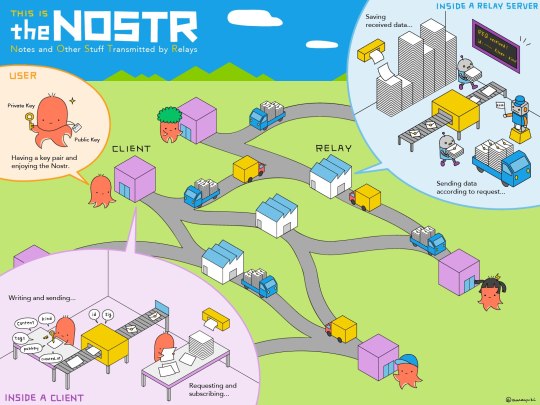
View On WordPress
#NOSTR zaps lightningnetwork#btc Bitcoin#carteira Lightning ZDB#censorship-resistant social media#chave pública nome de usuário#chave privada senha de sua conta#como surgiu e como usar o protocolo que descentraliza REDES SOCIAIS!#conta no Damus#decentralized#disponível sistemas iOS iPhone#download aplicativo Damus App#enables global#espécie de Twitter descentralizado#fruto da obra brasileiro desenvolvedor#GitHub#GUIA completo NOSTR: o que é#HTTP or TCP-IP#HTTP TCP-IP#livecoins#NOSTR 03:58 relays#Nostr sigla Notes and Other Stuff Transmitted by Relays notas e outras coisas transmitidas por relays#o futuro da internet#primeira aplicação criação do Damus App#protocol open standard#protocolo padrão aberto#pseudônimo de fiatjaf. Luciano Rocha - CriptoFácil#public-key cryptography#Satoshi Bitcoin#sistema de chaves do BTC#site Astral Ninja
0 notes
Text
Decentralized Social Media: Privacy, Freedom, and User Control
In the 21st century, the realm of digital discourse is shaped considerably by social media, and understanding its ceaseless evolution is pivotal to keeping pace with its fast-changing dynamics. The journey of social media from a simple form of communication to being instrumental in driving modern democracy has been a spectacle to behold. However, despite its meteoric rise, centralization, a key…
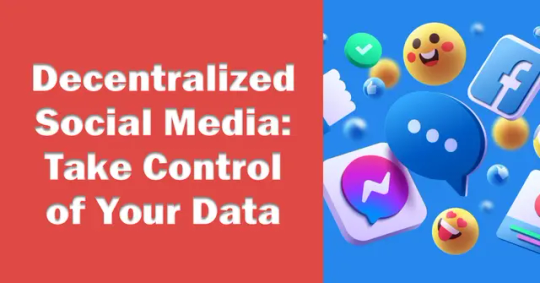
View On WordPress
#blockchain#Censorship#Censorship resistance#Centralization#Centralized social media platforms#Challenges of decentralized platforms#cryptocurrencies#Data distribution#Data privacy#Dawn of social media#Decentralization#Decentralized social media networks#Efficiency#Fake news#Freedom of speech#Future of social media#Gatekeeping power#Government regulations#Hybrid social media networks#Hybrid solutions#Mastodon#Network power distribution#Peer-to-peer network#Potential obstacles#Power dynamics#Privacy breaches#Privacy concerns#Public acceptance#Regulatory complexities#Revolutionizing communication
1 note
·
View note
Text
Hi, I'm Agie, and along with @transamus and @potionslushie I've been working on a big update to PierMesh, a project to bring cheap radio based, decentralized and disaster resistant web technology to trans women and other marginalized people. I've made a demo video of the WebUI and the underlying technologies of it which now include a DNS analog and a bidirectional peer to peer protocol. Please take a look and share this post around if you're so inclined.
764 notes
·
View notes
Text
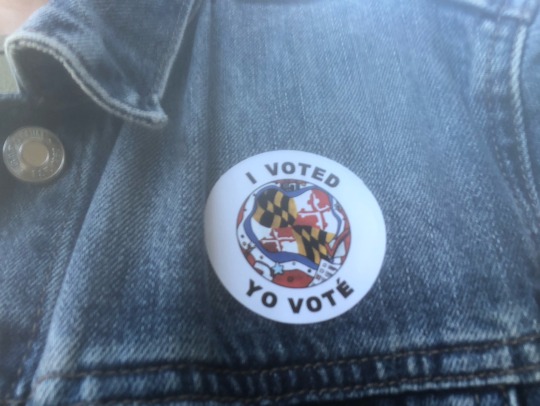
I haven't said as much about electoral politics this year as I have in previous cycles, because I am exhausted like everyone else and have nothing new or helpful to add. That is still true, so caveat lector I guess lmao!!! Happy American Election Day Fellow Sufferers!!
I have been experiencing an internal backlash the last few years to my extremely Sorkinpilled D.C. private school upbringing -- my childhood spent as a kind of convent schoolgirl in the faith of The System Is Good If We All Participate, which of course has a uhhh let's say generously a minimal engagement with the ways in which many of us are by design shut out of participating. I don't think idealism is necessarily childish, but I think MY idealism certainly has childish qualities, an undergirding of 90s feel-goodism, of civic participation as a subtle ego stroke and of voting -- although I would never have consciously put it this way -- as a way to feel superior to people who don't vote.
Lately there has bubbled up in me a sludgy, adolescent fury at this whole stupid country that has made it very very hard to feel like I should do even the bare minimum. For these people? AMERICANS? The ones that not only want Donald Trump to be president but saw what happened the first time and were like, We love this, do it again but worse? Whatever, fuckos. "I hope you people get your dearest wish and it chews you to death slowly," I may have thought.
I have also thought: why is it so controversial to ask elected officials to stop funding a genocide? Why are we treating people who make that ask, who are watching the current administration directly fund death on a mass scale and objecting to that choice, as if they are being babies and just need to get over it? How are they supposed to get over it? Why is anybody over it?
Anyway all this means that I, a known chipper door-knocker and caller of congresspeople, have been pretty low-key this current cycle. I think that is OK. I don't want to make this a big dramatic confessional about how I didn't write enough postcards or whatever. We all get exhausted and this was my turn.
But it has also been an illuminating cycle in that it's made it clear to me how much at my big age I still want politics to make me feel good, and when they don't, I still have the urge to throw a lil tantrum about it! I can get very superior and intellectual about how right-wing operatives manipulate their voters emotionally WITHOUT EVEN NOTICING that I too have been manipulated, in my case into the feeling that nonparticipation is a kind of revolutionary act.* Just absolute "I threw it on the GROUND" logic happening inside my head. "Maybe if I don't vote I will be doing Quiet Quitting, which is uhhhhh anticapitalist." I'm not a part of your system!!!
Anyway, I am trying to have self-compassion about it, and one way for me to do that is to project my internal experience onto a theoretical reader. That would be you, my imaginary friend who clicked on this post for some reason even though you have already decided not to vote! I just want to tell you that I am more sympathetic to your point of view than I have ever been in my whole life, and I'm sorry I have historically been a glib, holier-than-thou asshole about it in ways that may actually have made you MORE resistant to civic participation.
And you're right: it doesn't make that big a difference whether I personally vote or not, or whether you do. But if there are hundreds of us, and I think there are, then each of those people individually do starts to matter.
I guess I would humbly request that you and I both pay attention to what people who need help are actually asking for. I would ask that we both notice who wins when we abdicate this single responsibility. I would remind us both that participating in the electoral process is not some kind of weird either-or with participating in decentralized community building and mutual aid, and the best people we know do both. Isn't it interesting that somehow, insidiously, without even consciously becoming aware of this belief, we have started to think that you can only do one or the other? Who is telling us that story? Who does it serve?
Anyway. I took the stupid 90 minute round trip to my polling place which was VERY hot for some reason and I stood in the stupid line and some babies waved at me and I cast my vote for Kamala Harris and I'm glad I did it in the same way I'm glad after I do the dishes or take a stupid shower. Doing work doesn't always feel like anything. I also saw a really wonderful small black and white dog that I thought was a cat on a leash. I would not have seen that dog if I hadn't gone to vote. So politics can still make you feel good!!!
*I mean all this analysis is cute and everything BUT ALSO i did switch antidepressants twice in the last year, an astonishingly grueling process that almost made me [affect the trout population]. Could these things be related? hmmmmmmm, don't understand the question, won't respond to it.
220 notes
·
View notes
Text
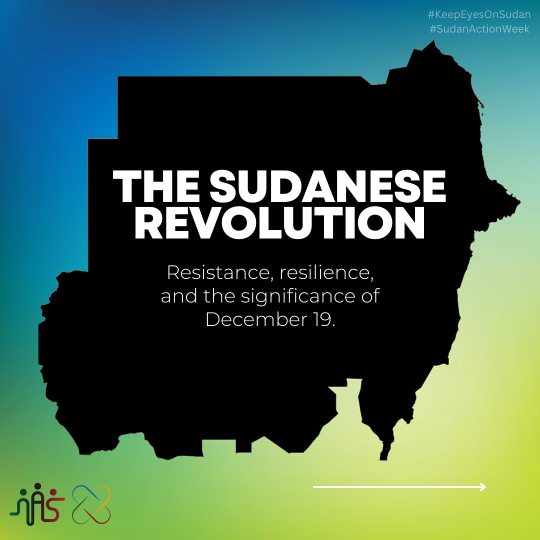
Via NasAlSudan
Learn about the Sudanese revolution, the significance of December 19, and a legacy of resistance and resilience.
Join our call to action today and everyday during Sudan Action Week.
December 19 2023
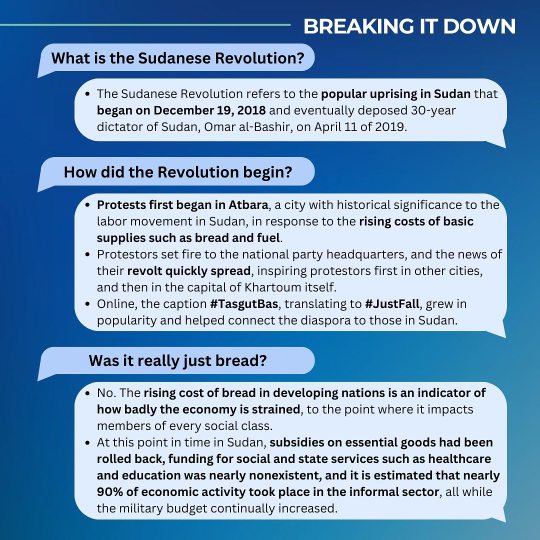
Transcript:
Breaking it down
What is the Sudanese Revolution?
The Sudanese Revolution refers to the popular uprising in Sudan that began on December 19, 2018 and eventually deposed 30-year dictator of Sudan, Omar al-Bashir, on April 11 of 2019.
How did the Revolution begin?
Protests first began in Atbara, a city with historical significance to the labor movement in Sudan, in response to the rising costs of basic supplies such as bread and fuel.
Protestors set fire to the national party headquarters, and the news of their revolt quickly spread, inspiring protestors first in other cities, and then in the capital of Khartoum itself.
Online, the caption #TasgutBas, translating to #JustFall, grew in popularity and helped connect the diaspora to those in Sudan.
Was it really just bread?
No. The rising cost of bread in developing nations is an indicator of how badly the economy is strained, to the point where it impacts members of every social class.
At this point in time in Sudan, subsidies on essential goods had been rolled back, funding for social and state services such as healthcare and education was nearly nonexistent, and it is estimated that nearly 90% of economic activity took place in the informal sector, all while the military budget continually increased.
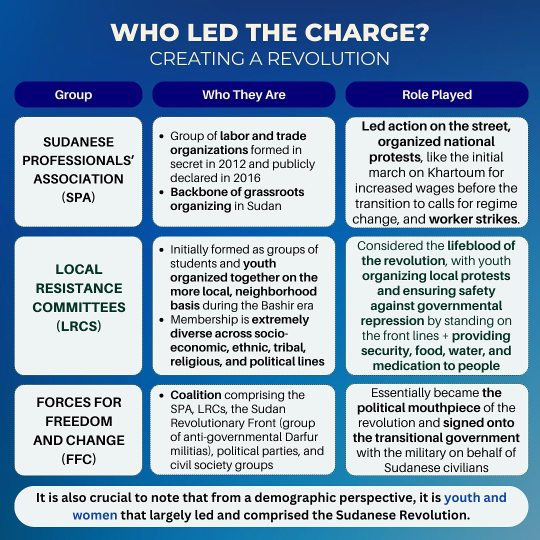
Transcript:
Who led the charge? Creating a revolution
Group: Sudanese Professional's association (SPA)
Who they are:
Group of labor and trade organizations formed in secret in 2012 and publicly declared in 2016
Backbone of grassroots organizing in Sudan
Role played:
Led action on the street, organized national protests, like the initial march on Khartoum for increased wages before the transition to calls for regime change, and worker strikes.
Group: Local Resistance Committees (LRCS)
Who they are:
Initially formed as groups of students and youth organized together on the more local, neighbourhood basis during the Bashir era
Membership is extremely diverse across socio-economic, ethnic, tribal, religious, and political lines
Role played:
Considered the lifeblood of the revolution, with youth organizing local protests and ensuring safety against governmental repression by standing on the front lines + providing security, food, water, and medication to people
Group: Forces for freedom and change (FFC)
Who they are:
Coalition comprising the SPA, LRCS, the Sudan Revolutionary Front (group of anti-governmental Darfur militias), political parties, and civil society groups
Role played:
Essentially became the political mouthpiece of the revolution and signed onto the transitional government with the military on behalf of Sudanese civilians
It is also crucial to note that from a demographic perspective, it is youth and women that largely led and comprised the Sudanese Revolution.
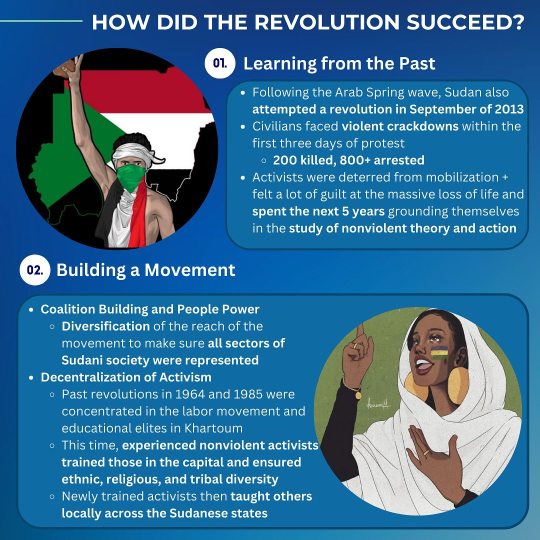
Trabscript:
How did the revolution succeed?
01. Learning from the Past
Following the Arab Spring wave, Sudan also attempted a revolution in September of 2013
Civilians faced violent crackdowns within the first three days of protest. 200 killed, 800+ arrested
Activists were deterred from mobilization + felt a lot of guilt at the massive loss of life and spent the next 5 years grounding themselves in the study of nonviolent theory and action
02. Building a Movement
Coalition Building and People Power
Diversification of the reach of the movement to make sure all sectors of Sudani society were represented
Decentralization of Activism
Past revolutions in 1964 and 1985 were concentrated in the labor movement and educational elites in Khartoum
This time, experienced nonviolent activists trained those in the capital and ensured ethnic, religious, and tribal diversity
Newly trained activists then taught others locally across the Sudanese states
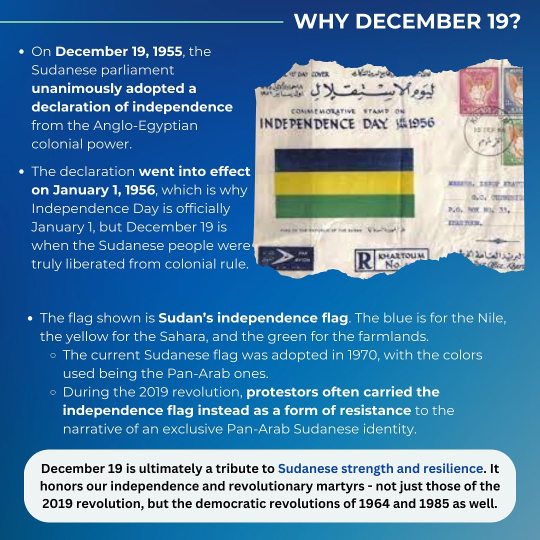
Transcript:
Why december 19?
On December 19, 1955, the Sudanese parliament unanimously adopted a declaration of independence from the Anglo-Egyptian colonial power.
The declaration went into effect on January 1, 1956, which is why Independence Day is officially January 1, but December 19 is when the Sudanese people were truly liberated from colonial rule.
The flag shown is Sudan's independence flag. The blue is for the Nile, the yellow for the Sahara, and the green for the farmlands.
The current Sudanese flag was adopted in 1970, with the colors used being the Pan-Arab ones.
During the 2019 revolution, protestors often carried the independence flag instead as a form of resistance to the narrative of an exclusive Pan-Arab Sudanese identity.
December 19 is ultimately a tribute to Sudanese strength and resilience. It honors our independence and revolutionary martyrs - not just those of the 2019 revolution, but the democratic revolutions of 1964 and 1985 as well.
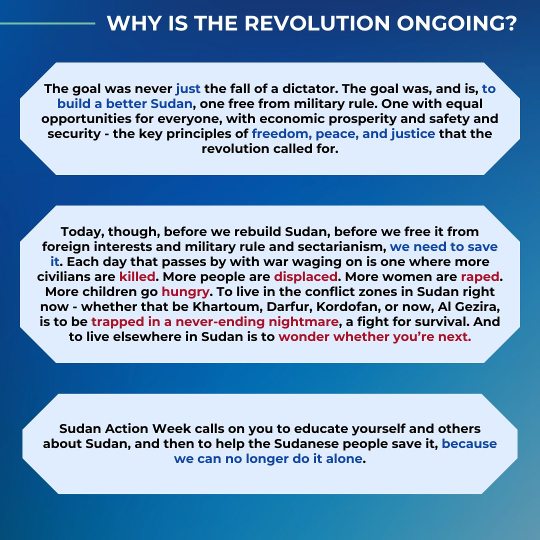
Transcript:
Why is the revolution ongoing?
The goal was never just the fall of a dictator. The goal was, and is, to build a better Sudan, one free from military rule. One with equal opportunities for everyone, with economic prosperity and safety and security - the key principles of freedom, peace, and justice that the revolution called for.
Today, though, before we rebuild Sudan, before we free it from foreign interests and military rule and sectarianism, we need to save it. Each day that passes by with war waging on is one where more civilians are killed. More people are displaced. More women are raped. More children go hungry. To live in the conflict zones in Sudan right now - whether that be Khartoum, Darfur, Kordofan, or now, Al Gezira, is to be trapped in a never-ending nightmare, a fight for survival. And to live elsewhere in Sudan is to wonder whether you're next.
Sudan Action Week calls on you to educate yourself and others about Sudan, and then to help the Sudanese people save it, because we can no longer do it alone.
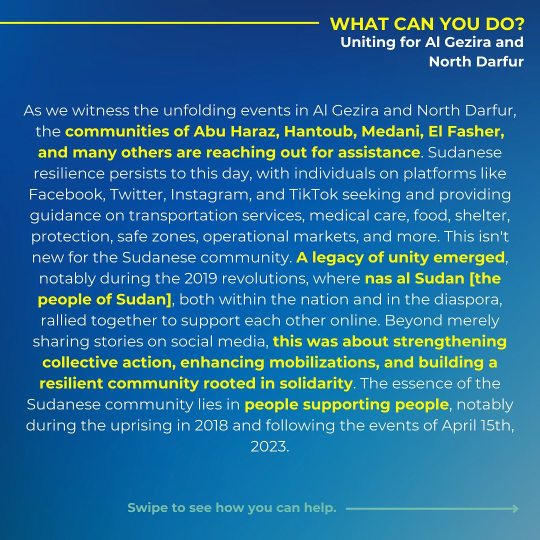
Transcript:
What can you do? Uniting for Al Gezira and North Darfur
As we witness the unfolding events in Al Gezira and North Darfur, the communities of Abu Haraz, Hantoub, Medani, El Fasher, and many others are reaching out for assistance. Sudanese resilience persists to this day, with individuals on platforms like Facebook, Twitter, Instagram, and TikTok seeking and providing guidance on transportation services, medical care, food, shelter, protection, safe zones, operational markets, and more. This isn't new for the Sudanese community. A legacy of unity emerged, notably during the 2019 revolutions, where nas al Sudan [the people of Sudan], both within the nation and in the diaspora, rallied together to support each other online. Beyond merely sharing stories on social media, this was about strengthening collective action, enhancing mobilizations, and building a resilient community rooted in solidarity. The essence of the Sudanese community lies in people supporting people, notably during the uprising in 2018 and following the events of April 15th, 2023
Swipe to see how you can help.
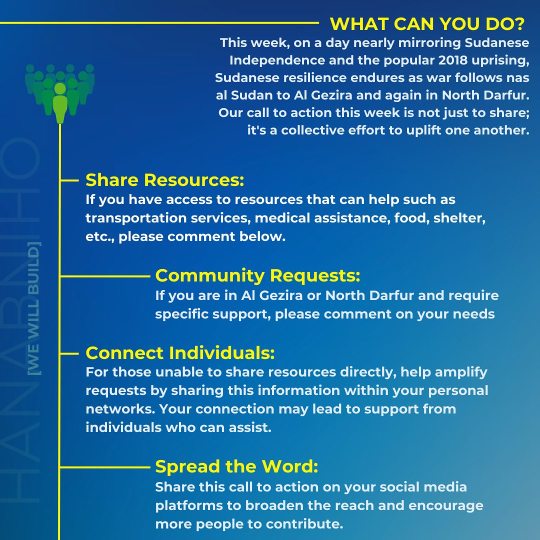
Transcript:
What can you do?
This week, on a day nearly mirroring Sudanese Independence and the popular 2018 uprising, Sudanese resilience endures as war follows nas al Sudan to Al Gezira and again in North Darfur. Our call to action this week is not just to share; it's a collective effort to uplift one another.
Share Resources:
If you have access to resources that can help such as transportation services, medical assistance, food, shelter, etc., please comment below.
Community Requests:
If you are in Al Gezira or North Darfur and require specific support, please comment on your needs
Connect Individuals:
For those unable to share resources directly, help amplify requests by sharing this information within your personal networks. Your connection may lead to support from individuals who can assist.
Spread the Word:
Share this call to action on your social media platforms to broaden the reach and encourage more people to contribute.
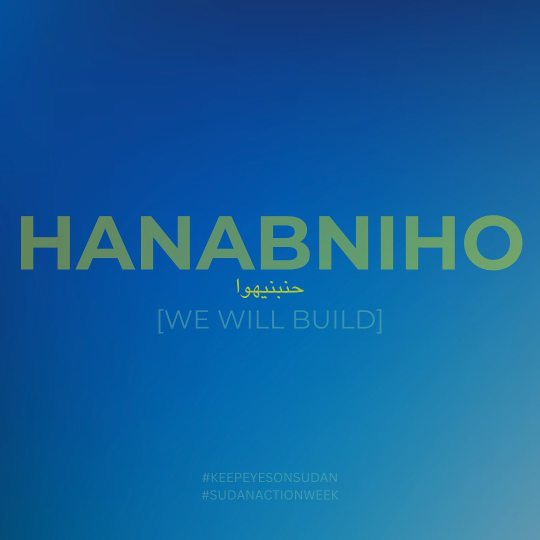
Transcript:
Hanabniho
حنبنيهوا
[We will rebuild]
#keepEyesOnSudan
#SudanActionWeek
924 notes
·
View notes
Note
the thing to remember is that the supposed might of the yankees is very much propaganda. a lie designed to make you think you don't stand a chance. but if we look at history the story is completely different. they lost in afghanistan. they lost in vietnam. the many military dictatorships in latin-america and the rest of the world they propped up lost. the native peoples of the so called united states are still here. and just like that their little murderous client state israel will lose in palestine.
there's no real way for them to win other than to make you believe they've won. apart from the myriad ways to materially resist and learn from those who've been or are in this situation, inculcate in yourself and those around you: you haven't lost until you've given up.
it's true! A colonial power fighting against a decentralized, asymmetrical resistance that is local to the region is always operating at a massive (and expensive) disadvantage. Thanks Anon.
69 notes
·
View notes
Text
Cephalonoid

Image © Terryl Whitlatch, accessed at CG Channel here
[Sponsored by Soluman Blevins, based on art that Terryl Whitlatch did for her book Principles of Creature Design. At one point in development, I intended for this to be one of the illithidae, but found myself getting more and more sympathetic to it, so changed the alignment away from evil. Thus, they became the rarest of monsters; an octopus creature whose behavior is actually based on that of an octopus.]
Cephalonoid CR 12 N Aberration This creature looks like a hybrid of an octopus and a carnivorous dinosaur. Its head is like that of an octopus, except that its beak is on a long stalk, emerging visibly from the nest of tentacles growing from its face. It walks on all fours, but it can rise on its hind legs like a gorilla. Its fingers and toes are jointless and tentacle-like, and a row of suckers runs down its back and along the upper surface of its tail. A coiling shell grows from the crown of its head, with an inflatable pouch beneath it.
Cephalonoids are strange sapient predators that resemble a hybrid of mollusk and vertebrate. They are amphibious, hunting either above or below the waves and then hiding underwater in order to sleep. Cephalonoids are curious and voracious creatures, and spend much of their lives either hunting or playing. These two activities are perhaps synonymous, as cephalonoids seem to enjoy playing with their food.
A cephalonoid’s primary strategy is to grapple prey and crush it while it struggles to escape. Their beaks are more extensible than those of true cephalopods, but still possess a shorter reach than its many grasping limbs. Creatures bitten by a cephalonoid are injected with a numbing venom, all the better to cut their struggle short and make them easier to constrict. A cephalonoid can spray toxic ink, which can form a concealing and enervating cloud both above and below water. They are highly resistant to mind-influencing magic, which has led some scholars to suspect that they have a link to aboleths, illithids, or one of any number of tentacle horrors with mental powers. Cephalonoids show these creatures no love, and may in fact prey preferentially on them if their ranges overlap.
Unlike the octopus they resemble, cephalonoids are long-lived creatures, with lifespans that can extend up to fifty years. They are territorial amongst their own kind and do not tolerate intrusion, except during mating season or in the guarding of eggs. Female cephalonoids lay their eggs in colonies called gardens, where they watch over them, fasting for months until they hatch. The young are then left to fend for themselves, and may be mistaken for mundane octopus for a few years before their skeleton grows in and they begin to move about on land. Cephalonoids do not understand concepts like domestication or private property, and may come into conflict with humanoids above or below the waves for raiding livestock.
Cephalonoid CR 12 XP 19,200 N Gargantuan aberration (aquatic, amphibious) Init +8; Senses blindsight 30 ft.,darkvision 60 ft., Perception +17
Defense AC 24, touch 10, flat-footed 20 (-4 size, +4 Dex, +14 natural) hp 171 (18d8+90) Fort +11, Ref +12, Will +14; +4 vs. mind-influencing effects DR 10/magic and [slashing or piercing]; Immune poison; SR 23 Defensive Abilities decentralized brain
Offense Speed 30 ft., swim 30 ft. Melee bite +18 (2d4+9 plus poison), 2 slams +18 (2d6+9 plus grab), tentacles +18 (4d8+9 plus grab), tail slap +16 (1d12+4 plus grab) Space 20 ft.; Reach 20 ft. (10 ft. with bite) Special Attacks constrict (4d8+15), ink cloud, master grappler
Statistics Str 30, Dex 19, Con 21, Int 7, Wis 16, Cha 12 Base Atk +13; CMB +27 (+35 grappling); CMD 46 Feats Bleeding Critical,Critical Focus,Defensive Combat Training, Diehard, Endurance, Improved Critical (bite), Improved Initiative, Lightning Reflexes, Multiattack (B), Power Attack Skills Climb +20, Escape Artist +24, Perception +17, Stealth +15, Swim +28; Racial Modifiers +10 Escape Artist, +4 Perception, +8 Stealth Languages Aquan
Ecology Environment any ocean or coast Organization solitary, pair or garden (3-8) Treasure incidental
Special Abilities Decentralized Brain (Ex) A cephalonoid’s intelligence is distributed through its entire body. This grants it a +4 racial bonus on all saving throws against mind-influencing effects. Ink Cloud (Su) As a standard action, a cephalonoid can create a cloud of ink in a 30 foot radius, either above or below water. This ink impedes vision as a fog cloud spell, and creatures in the area must succeed a DC 24 Fortitude save or be sickened and staggered for as long as they remain in the cloud and for 1d4 rounds thereafter. A cephalonoid can make an ink cloud once per minute. This is a poison effect, and the save DC is Constitution based. Master Grappler (Ex) A cephalonoid gains a +8 racial bonus to CMB checks made to grapple; this replaces the usual +4 for creatures with the grab special attack. A cephalonoid does not take a penalty to grappling without having two free hands, and can grapple up to four creatures smaller than itself at the same time. Poison (Ex) Bite—injury; save Fort DC 24; frequency 1/round for 6 rounds; effect 1d4+1 Str; cure 2 saves. Tentacles (Ex) The oral tentacles of a cephalonoid are treated as a single primary natural weapon.
52 notes
·
View notes
Note
Hello, ( ´ ▽ ` )ノ
I was re-reading Eye in the Sky, literally hits me in the gut every time I read it I swear the amount complex emotions and relationships all from an outsider POV it's just, I can't but I digress.
Diana did have this whole speech about wanting Bruce to "come back to them" but it's said outright that she'd be 100% kill him is it weren't for Kal interfering. How much of her speech is true about wanting him scared, or was it all just to try to get sympathy/ confuse Duke or any potential listeners. If Bruce were to "give up" (not that it would happen) would she accept him back into the fold as one of the Leaguers and as Batman?
Also, the meeting where they show off Tim, Jason and Dick very obviously misses Damian, Cass and Steph.
My interpretation of the og Injustice -verse was that Damian joined Superman partly due to him believing that villains should be killed but also partially because Dick's accidental death left a rift between him and Bruce that Damian was too scared to address.
However, Dick is very much Alive and at no point does Bruce ever mention Damian joining the Regime willingly.
Are there any crumbs you'd be willing to share?
I don't think Diana outright wants to kill Bruce, but I'm sure she's happy to make threats and attempts she knows will rattle him. We get Duke's POV for this fic so he takes Bruce and the others at face value when they imply the motivation behind these attempts. I think Bruce deep down knows that Diana wants to spook him, wants to make him change his mind, wants to push him and express her anger and frustration. If she killed him without succeeding in getting him back in the Trinity, it wouldn't be worth it. Right?
If Bruce gave in, yes I think Diana would accept him back. She has strong opinions about right and wrong and having a humbled Bruce would satisfy any remaining anger, I think. She's not vengeful, or not in the way we might predict her to be. I think she told Duke much more of the truth than he realized. It was a highly vulnerable moment for her -- she's tired of this too. She didn't want this either.
The characters who aren't obviously referenced by the fic so far are the ones who managed to escape or evade the Regime in some form. We'll see a few of them next chapter. But they're decentralized and isolated, which felt more like a realistic resistance to me.
Thank you so much for reading!
#asks#anon#eye in the sky#injustice#injustice: gods among us#bruce wayne#batman#dc#myfic#theresurrectionist#batfamily#diana prince#wonder woman#duke thomas
39 notes
·
View notes
Text
Radical feminisic core beliefs in the fictional culture of the Mandalorian People
The Mandalorian culture in both Disney and Legends canon can be interpreted as "radical feministic" in essence when viewed through the lens of specific radical feminist principles, particularly those centered on rejecting patriarchal norms, fostering egalitarianism, and valuing collective strength over traditional gender roles. Here's how this interpretation can be supported:
1 .Rejection of Gender Roles and Patriarchal Norms
Disney Canon:** In *The Mandalorian*, female warriors such as Bo-Katan Kryze and the Armorer hold leadership positions and are respected on equal footing with their male counterparts. The culture places no emphasis on traditional gender roles, showcasing men and women alike as warriors, leaders, and protectors of their people.
Legends Canon: Karen Traviss' *Republic Commando* novels expand on Mandalorian culture, emphasizing the practical, no-nonsense approach to gender. Women, like men, are trained as warriors from a young age. The culture prioritizes competence and contribution over biological or societal expectations tied to gender.
This aligns with radical feminism's critique of patriarchal gender constructs by showcasing a society where roles are based on merit and capability rather than gender.
2. Valuing Motherhood Without Exploitation
Mandalorian culture celebrates motherhood, but not in the patriarchal, exploitative sense that ties women's worth to reproductive roles. Instead, motherhood (and parenthood in general) is honored as an essential act of cultural preservation. The practice of adopting foundlings, irrespective of biological ties, reflects a communal approach to child-rearing that values nurturing as a collective responsibility.
This ties into radical feminist ideals by elevating the importance of caregiving without confining it to women or devaluing it as "unproductive labor."
3. Egalitarianism and Anti-Hierarchy
Mandalorian culture is often portrayed as decentralized, with clans and individuals having significant autonomy. Leadership, such as that of the Mand'alor, is based on merit and the ability to unify the people, rather than hereditary or hierarchical systems.
Radical feminism critiques hierarchical systems as inherently tied to patriarchal power structures. Mandalorian society’s rejection of rigid hierarchy and its emphasis on mutual respect and collective survival align with these values.
4. Focus on Strength and Solidarity
Mandalorians emphasize community and solidarity over individualism. Their creed prioritizes loyalty to the group, collective strength, and mutual aid, which are key principles of feminist and eco-socialist thinking.
In Legends, this is exemplified by the communal lifestyle of the Mandalorian clans, where resources and responsibilities are shared. In Disney canon, the adoption of foundlings reflects a commitment to care for the vulnerable as a collective duty, breaking the cycle of exploitation often seen in patriarchal systems.
5. Anti-Imperialism and Resistance to Oppression
Mandalorians have a long history of resisting imperialism, whether under the Republic, Empire, or other external forces. This mirrors radical feminism’s commitment to dismantling systems of domination and oppression. Their refusal to conform to external norms and their insistence on maintaining their culture and values resonate with feminist resistance to patriarchal imposition.
6. Empowered Female Leadership
Both canons prominently feature strong female leaders. Bo-Katan Kryze, Satine Kryze, and Ursa Wren are examples of women leading their people with agency and authority, free from patriarchal constraints.
Radical feminism seeks to dismantle the notion that leadership and power are inherently masculine traits. Mandalorian women’s leadership roles exemplify this rejection of patriarchal norms.
Caveats
While Mandalorian culture can be interpreted as embodying radical feminist principles, it is important to note:
The Mandalorians are also deeply martial and honor-driven, traits that could conflict with radical feminist critiques of militarism.
But the approach to see sex differences as fact but still honor them without hindering both sexes to become part of the leadership by merit is indeed in core identical to radical feministic view of biology-based sex-essentialism as fact with including dismantling patriarchy and promote egalitarianism and meritocracy
Conclusion
Mandalorian culture in Disney and Legends canon reflects radical feminist principles by rejecting traditional gender roles, emphasizing egalitarianism, honoring caregiving without exploitation, and fostering solidarity and resistance to domination. These elements align with the core radical feminist goal of dismantling patriarchal systems and creating societies based on mutual respect, equality, and collective well-being.
There are also Proverbs in canon which prove radical feminist approach on the gender equality despite factual approach on sex biological differences in universe, which proves the antipatriarchic structure of mandalorian Warrior Mentality, which can be confused with virtues of "masculinity", but count for both sexes in the mandalorian society:
“There is nothing a Mandalorian man fears more than a Mandalorian woman.” - old proverb, not Mandalorian in origin
“You piss off our men, you'll end up with a lot of dead soldiers and maybe a few damaged buildings. But you piss off our women and...well, you'll be feeling the side effects for years to come.” - Mandalore the Destined
“Mandalorian women are frightening. They're smart, angry, and can shoot better than most men. Mandalorian men are a force to be reckoned with. But Mandalorian women? They're a kriffing force of nature.” – Zakc Paxus, noted Mandalorian author
“Mandos don't get all mushy about love. No poetry, no creepy obsessions; either you love someone, or you don't. If you do, you marry 'em and fight alongside them for the rest of your life. If not, you just fight alongside them.” - Mandalore the Fair (first female Mandalore, named for her honorable ruling rather than her appearance)
“A Mandalorian woman's greatest talent is not her charm or beauty, but her strength of body and will.” - Mandalorian proverb
#radical feminism#radfemblr#radfemally#fuck the patriarchy#radfeminism#smash the patriarchy#gender equality#mandalorian culture#mandalorian women#egalitarian#meritocracy#radical feminist community#radical feminist safe#star wars mandalorian
28 notes
·
View notes
Text
Pagan Pulse: Social Media Revolution

In a dramatic turn of events, the United States has officially banned TikTok, a move that has left millions of users searching for alternatives and ignited a surprising cultural rebellion. The unexpected winner? A Chinese app called Red Note (小红书 Xiǎo hóng shū), which has become the new digital haven for Americans looking to reclaim their online communities and creativity. This seismic shift comes as Pluto, the planet of transformation and upheaval, makes its long-anticipated move into Aquarius, a sign known for rebellion, innovation, and collective action.
TikTok Ban Sparks Outrage and Exodus
The U.S. government’s decision to ban TikTok, citing national security concerns over its Chinese ownership, has caused a ripple effect across the digital world. For years, TikTok has been a hub of cultural innovation, a platform where users across the globe shared everything from viral dances to political commentary. Now, as its American user base is cut off, the platform’s future hangs in the balance.
The ban has sparked intense debates about freedom of expression, government control, and the global reach of digital platforms. Many view the move as an overreach that disrupts communities built over years of shared content and creativity.
The Astrological Connection: Pluto in Aquarius
Pluto’s recent transition into Aquarius has set the stage for a cosmic upheaval that mirrors the dramatic changes unfolding in the digital world. Known as the planet of transformation, Pluto governs profound systemic shifts, while Aquarius rules innovation, rebellion, and collective progress. Together, these energies are driving a sweeping transformation in how we connect and create online.
As I noted in an earlier article on Medium, Pluto’s Big Move into Aquarius: 20-Year Cosmic Shift:
"Last time Pluto graced Aquarius, we saw the French Revolution and the Industrial Revolution. Think societal upheaval, revolutionary ideas, and technological innovation that reshaped human history. This energy doesn’t tiptoe — it bulldozes."
True to form, Pluto’s influence in Aquarius emphasizes decentralization and the redistribution of power. As TikTok users migrate to alternative platforms like Red Note, this shift embodies the Aquarian spirit of collective action and a desire to innovate beyond traditional systems.
Why Red Note? A Symbol of Resistance
Red Note’s sudden popularity is as much a statement as it is a practical shift. Its origins as a Chinese platform make it a poignant choice for Americans responding to the TikTok ban. The app’s rise demonstrates the resilience of digital communities and their willingness to embrace new platforms to stay connected.
This migration reflects a broader trend of users rejecting centralized control in favor of alternatives that align with their values. The collective embrace of Red Note signals a powerful act of defiance against perceived governmental overreach.
Global Ripple Effects
The U.S. isn’t the only country where TikTok’s future is in jeopardy. Nations like India and Australia, which have also restricted TikTok in the past, are closely observing the American exodus. Early reports suggest that users in these countries are exploring Red Note and similar platforms as potential replacements.
Meanwhile, TikTok is already feeling the impact of losing its U.S. audience. Without the vibrant contributions of its American user base, which has been central to its global appeal, the platform’s dominance faces significant challenges.
The Future of Social Media in the Age of Aquarius
Pluto’s influence in Aquarius is just beginning, and its energy will continue to challenge traditional systems and hierarchies in the coming years. The TikTok ban and the rise of Red Note may be the first of many transformations in the digital space. Decentralized platforms, user-driven movements, and unexpected alliances are likely to shape the future of social media.
For now, Red Note stands as a testament to the power of collective action and the resilience of online communities. Whether it becomes the next global sensation or a temporary refuge, its rapid ascent underscores one undeniable truth: the social media landscape is undergoing a revolution, and the people—not governments—are leading the charge.
As the age of Aquarius unfolds, one thing is clear: the digital world will never be the same. Follow @paganpulse for More like this.
#pagan news#breaking news#news#learning magick#witchcraft info#witchcraft blog#witchcraft 101#herbalism#witchy aesthetic#oracle reading#healing energy#astrology news#astrology#pagan pulse#小红书#tiktok#xiaohongshu#little red book#tiktok ban#red note#social media
19 notes
·
View notes
Text
@skelekingfeddy submitted: hey so i was reading through your homestucksona tag and i decided to draw some of your concepts, namely sahlee’s lusus, the midnight crew, and the Palace Historian! i also sprinkled in some of my own ideas (i mean i literally made a whole new exile LOL) hope you like it!

Holy hell, that is some top god-tier spritework. You've officially canonized my Grubsprite's design.

In fact, I don't even know if this was deliberate, but her wires look a lot like the ones in this picture of Sahlee. Above is the same image, without the shadow layer, and even the colors match.
The idea here is that Sahlee is using her psionics to interface directly with her technology. I like the idea that she's able to 'talk' to Grubmom over the network - they probably play a lot of video games together. Maybe it was Grubmom who told her about the most important video game of all.

It feels so right that DD is the best hacker in the Crew. Those glasses were actually part of Sahlee's as-yet-unseen alchemy binge - and unfortunately for her, he actually knows how to use the computer inside.
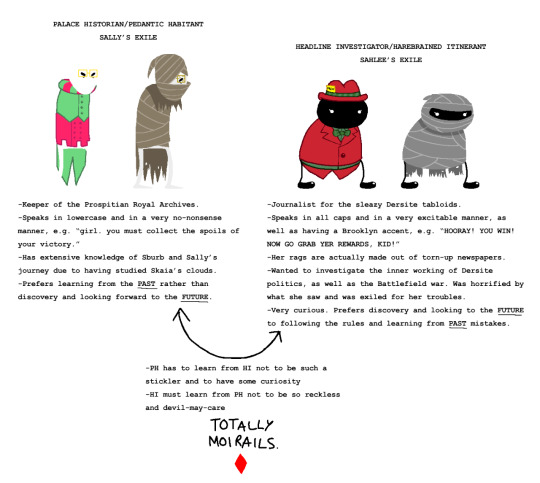
I love the Investigator, too. I think the catalyst for her Exile was her association with one particular Dersite - a Battlefield farmer who wished to end this pointless war.
By this point, the Investigator had pilfered several files from the Black Queen's private archives, and learned more than any rank-and-file Carapacian was ever supposed to know. She knew that her friend's uprising would be sabotaged by Paradox Space - so she suggested a more decentralized form of resistance.
Together, they worked on a tell-all news article about the true cost of the War. They didn't pull any punches, either - the article called Derse's entire raison d'etre into question, demanding to know what the Royal Plan even is.
"WHAT HAPPENS WHEN WE WIN, EH?
AIN'T IT KINDA WEIRD THAT THE SUITS HAVEN'T TOLD US?
ALL THOSE BOYS IN MAROON... WHAT ARE THEY ACTUALLY FIGHTIN' FOR?"
It even dared to ask why they hated Bilious Slick.

Anyway, the Black Queen caught the article through the malware she'd hidden in PawnziBuddy, a 'virtual tyrant' that every Dersite is legally required to install. She canned the article, Exiled the Investigator, and turned the tabloid's server rack into a GristCoin mine.
HI also sent a copy to a Prospitian she trusted - but, oddly enough, that archivist vanished without a trace. Prospit is surely beyond the Black Queen's reach, so it was probably just an unhappy coincidence.
Sad, though - that document could have won Prospit the war. It's too bad that the White Queen never got her hands on it.
#homestuck#homestuck liveblog#full liveblog#act 5.2#homestucksona#asks#PH (reluctantly) helped her break into Derse's archives. king#They're basically the same as Prospit's‚ save that the theme music is in a minor key
151 notes
·
View notes
Text
What is a Cypherpunk?
The term "cypherpunk" refers to a movement and a community of activists advocating for the widespread use of strong cryptography and privacy-enhancing technologies as a route to social and political change. Emerging in the late 1980s and early 1990s, the cypherpunk movement is a confluence of libertarian political philosophy, hacker ethos, and cryptographic science.
The Core Traits of Cypherpunks
1. Advocacy for Privacy and Anonymity: Cypherpunks champion the right to privacy, emphasizing that individuals should have control over their personal information and digital footprints. This advocacy is often in direct opposition to government surveillance and corporate data collection practices.
2. Use of Cryptography: The cornerstone of the cypherpunk movement is the use of strong cryptography to secure communications and transactions. Cypherpunks believe that through cryptographic techniques, individuals can protect their privacy in the digital world.
3. Open Source and Decentralization: A significant trait among cypherpunks is the belief in open-source software and decentralized systems. This ethos promotes transparency, security, and resistance to censorship and control by central authorities.
Who are the Cypherpunks?
The cypherpunk community consists of programmers, activists, academics, and technologists. Notable figures include Julian Assange, the founder of WikiLeaks; Jacob Appelbaum, a former spokesperson for the Tor Project; and Hal Finney, a pioneer in digital cash systems. The manifesto "A Cypherpunk's Manifesto" by Eric Hughes (1993) [https://www.activism.net/cypherpunk/manifesto.html] eloquently encapsulates the philosophy and ideals of this movement.
The Cypherpunk Movement
Cypherpunks are not a formal organization but rather a loosely associated group sharing common interests in cryptography and privacy. The movement's origins can be traced to the “Cypherpunks” mailing list, started in 1992 by Eric Hughes, Timothy C. May, and John Gilmore. This list served as a platform for discussing privacy, cryptography, and related political issues.
Relation to Cyberpunk Principles
While cypherpunks share some overlap with the cyberpunk genre of science fiction, they are distinct in their real-world activism. Cyberpunk literature, like William Gibson's "Neuromancer" (1984) [https://www.goodreads.com/book/show/6088006-neuromancer], often presents a dystopian future where technology is pervasive and oppressive. In contrast, cypherpunks aim to use technology, specifically cryptography, as a tool for empowerment and resistance against such dystopian futures.
Notable Contributions and Technologies
The cypherpunk movement has been instrumental in the development of technologies that emphasize privacy and security:
Tor (The Onion Router): A free and open-source software for enabling anonymous communication [https://www.torproject.org/].
Pretty Good Privacy (PGP): A data encryption and decryption program that provides cryptographic privacy and authentication [https://www.openpgp.org/].
Bitcoin: The creation of Bitcoin by an individual or group under the pseudonym Satoshi Nakamoto was heavily influenced by the ideas of the cypherpunk movement. It embodies principles of decentralization and financial privacy [https://bitcoin.org/en/].
Wikileaks: Founded by Julian Assange, WikiLeaks is a multinational media organization that publishes news leaks and classified media provided by anonymous sources [https://wikileaks.org/].
Conclusion
The cypherpunk movement is a critical lens through which to view the ongoing dialogue about privacy, security, and freedom in the digital age. While not an organized group, the collective impact of cypherpunks on modern cryptography, internet privacy, and digital rights is profound. As digital technology continues to permeate every facet of our lives, the principles and contributions of the cypherpunk community remain more relevant than ever. - REV1.
84 notes
·
View notes
Text
Destroyer - A Sentence of Sorts
(Masterlist)
(Content: mass death, alcohol, physical abuse, verbal abuse, guilt, self loathing, minor suicidal ideation, implied self harm)
=======================
Delta read the death toll again. 2,367 was the beginner estimate. There was not as much outcry as there was about Lemuria, nor was there the same circus of gore. The fact that it was an attack on Nezu did little to comfort him. He didn’t care for the nuances. In him there was an almost childlike sensibility. He diligently added the new deaths to his personal count. In his half-asleep state, what felt like the great tragedy was not the number itself, but the fact that it could never be reduced. It was the math he was fixated on. It wasn’t fair.
He realized quickly after re-entering the Empire portal that it had been bifurcated between the two sides of the war. He also realized, to his shock, that he’d been grouped into Nezu’s side. He’d actually forgotten that he’d stolen the laptop from one of Nezu’s people. They must have been either dead or on vacation; no one else was ever active on any of the accounts. He had to re-configure a lot of the settings and passwords to regain access to the portal, no doubt indicating a massive security crisis on their side. He scanned the bulletin they’d posted. Saber rattling. In memoriam.
Empire could not afford this war. They’d already stretched themselves thin across the different fronts, practically at the height of their expansionism when the Emperor had died. They faced opposition from a host of recognized nations, as well as a new crop of organized resistance groups that existed solely to topple the whole thing. Empire still wasn’t weak, not by any stretch of the imagination. Its power structure was decentralized enough to survive the past months without anyone at the helm. But Paris and Nezu forcing Empire in half threatened to break the entire web into a whole spectrum of disjointed pieces.
Delta paused. Did he want that? He thought of it as a kind of apocalypse scenario, but he supposed it was technically in alignment with his own goals. With the civil war raging, Empire was planting the seeds of its own demise. But they were just seeds.
He looked back at the death toll. There’d be hell to pay before it finally broke apart.
He posted the next leak to a new thread, quickly shutting out of the tab before he had time to see anyone’s reaction. He updated semi-regularly now, attaching both current plans and declassifying older files from the early days of Empire. The latter was more for his own curiosity than anything else. To him, it felt like a small act. He was used to the light shows, bold acts of destruction and slaughter. Working with intel was so much subtler; it was hard to trace any development back to something he had released. All he had were suspicions, really. Suspicions and a few messages.
katkittykat: ok rlly can i ask where ur getting this shit
katkittykat: whos ur connection hehehe :3
ndhakdvsnnd: nobody and i dont know what youre talking about
katkittykat: its a lil late to play coy yknow
katkittykat: u dont have 2 b scared of me!!! i want to help u
ndhakdvsnnd: shut up
katkittykat: wtf!!! rude >:3
katkittykat: pretend that face is frowning but its still a cat
katkittykat: wait i got it
katkittykat: /ᐠoᆽoᐟ \╭∩╮
sunspot: Hey thanks again for the leak !! Im sorry about kitty actually im sorry about both of us
sunspot: We arent trying to push you into anything really we are just curious about you
sunspot: Sorry if its stressing you out i would probably be stressed out too in your situation
ndhakdvsnnd: you dont know fuck about my situation
sunspot: Yeah thats true! But I know youve been helping us a lot and we are kind of worried about you
ndhakdvsnnd: who is we why do you keep saying we
ndhakdvsnnd: yes you are stressing me the fuck out thanks for acknowledging that
ndhakdvsnnd: didnt you say you were going to stop prying id really appreciate it if you did
sunspot: Fair enough! I havent been that upfront with you either so I guess i am not in a position to be asking so much. If you want to know what is happening on our end i will tell you and maybe that will help?
ndhakdvsnnd: okay
ndhakdvsnnd: not now
sunspot: Talk later?
ndhakdvsnnd: i have to go
sunspot: Okay be careful then!
ndhakdvsnnd: thanks
Delta exited out. He got other messages - many, many others - but none as annoyingly persistent as those two. He didn’t know why he kept talking to them. When they answered, it was bad. When they didn’t, it was even worse. He stepped away from the computer, badly needing a break. He wouldn’t get it, of course, not for more than five minutes. He needed to go see Paris.
==========================
The bottle almost nailed him in the fucking head. Delta hissed, softly, his bright eyes flashing violently.
“You’re late,” Paris let his head loll a little, a lazy smile quirking at his lips. Delta didn’t bother trying to defend himself. His vocal cords were still burnt out, rendering him mute for a time. He moved to the prince’s side, dropping into a kneel. Paris backhanded him before he’d even gotten all the way down. Eager today. Delta winced, immediately moving to touch the tender skin. He knew it had broken; Paris had blood on his ring. He grabbed Delta’s wrist before it could make contact and did not let go.
“Take your hair out,” He ordered. Oh. Delta had forgotten. Paris still didn’t let go of his wrist, so he had to remove the tie with one hand. He slipped it onto his wrist, letting his hair fall loosely down his back.
“Let me see,” Paris said. Delta tilted his head a little, not understanding. After a minute, he offered Paris his other hand. Paris slid the hair tie off, doubling it over a few times to bind Delta’s wrists together. Delta let them fall in his lap. Not a particularly difficult restraint to get out of, but that didn’t matter. Delta knew better than to try it.
He didn’t understand why Paris had started calling him here again. Besides the little indiscretions with the laptop, he’d been on his best behavior. He had honestly been trying to make it easier on him, but it had no effect. Paris had been difficult before the accident. These days, he was impossible.
He was also tipsy, which was historically worse. Drunk enough to lose any inhibitions, but not drunk enough to let Delta get away with anything. It was a losing game. He was almost glad he couldn’t speak; at least he couldn’t say the wrong thing and send the prince off in a spiral. It was all too easy to do that now, but nobody paid for it the way Delta did.
“Why did you change?”
That caught him off guard. Delta could’ve asked him the exact same thing, of course. But that wasn’t what bothered him. It was so unfair. Paris, who had all the social grace of a methed up honeybadger, could still read people without any apparent effort. Delta wilted a little bit under his gaze, a small pang of guilt striking him. He thought again about destroying the computer. He thought about it everyday. He bowed his head in apology. Not good enough, apparently. Paris kicked him onto his back. Unable to catch himself, he knocked his head into the carpet, wind knocked out from the blow. Paris had stood up.
“You think I can’t tell?” His voice was unsteady, pitchy, the way it had been ever since he got back. He was getting worked up, Delta could tell. He stifled a groan. This was going to be a long night.
“I was only out for a fucking month, what changed? Why is everyone acting like the show is over?”
Delta felt a sudden kick in his side. Paris gripped his collar. He was light; it was not hard to drag Delta off the ground, even unwillingly. Paris only did it half-way, throwing him back into the desk. Delta’s back slammed into it, again unable to catch himself. He bounced off it, back onto the ground. Slowly, he repositioned himself into a kneel, more muscle memory than conscious effort.
“You know all this could have been prevented if he just wrote a will. The old man thought he would never die. They pierced me right though the exact same place they got him, you know that? Just an inch from the heart. I didn’t ask for a civil war. It’s my birthright, I shouldn’t have to-“
Paris slapped him in the face, “Are you even listening? This is about you.”
Delta nodded, even though it clearly wasn’t. He knew Paris was just taking his anger out on him because he was there — because he couldn’t do anything about it. Delta accepted this with the kind of quiet resignation that only ever seemed to irritate the situation.
“Fucking stop!” The prince yelled. God, he was never happy. He circled behind Delta, landing a kick squarely on his shoulderblades. It sent him forward, onto his hands and knees. Before he could recover, Paris kicked him again in the side, with enough force that he fell flat onto the carpet. For some reason, the rug caught his eye. It was weaved of soft blue fiber.
Delta thought of Lemuria — and of the ocean. Paris kicked him in the stomach, but he didn’t hear what he said. 2,367 dead, in addition to the 22,534 previous. They were all-star numbers. Paris knocked his leg out, forcing Delta flat on his back. He straddled his waist, which Delta admittedly found much harder to ignore. He winced as Paris’s hands wrapped around his throat, the one still too burnt for him to speak with. His collar gave off a little dryer spark; Paris cursed. Delta thought of all the lives he’d destroyed in the past months alone, the ones he’d never know, the count that would never go down. What kind of terror did they feel in their final moments? How badly did it burn? He didn’t fight as Paris beat him. Fair is fair. Even as the grip tightened, threatening to choke off his air, he didn’t resist it. It was right that he should die. It would be right if he died 25,000 times over.
Paris didn’t give him the satisfaction. His eyes had been burning above him, but they gradually turned to cinders, the pressure letting up. He didn’t look much calmer, but he did look exhausted. He was still injured. The beating might’ve taken more out of him than it did Delta.
Delta couldn’t ask to be dismissed. He wouldn’t have. When Paris did throw him out, he felt a vague and numinous dissatisfaction. He was being punished for the wrong reasons. It wasn’t enough. In the hallway, he unbinded his own hands. He pulled the band back against his wrist, letting it snap hard against the skin.
#whump#whump community#whump scenario#living weapon whumpee#whump prompt#living weapon#mass death#alcohol#physical abuse#verbal abuse#guilt#self loathing#minor suicidal ideation#implied self harm#delta#paris#kitty
31 notes
·
View notes